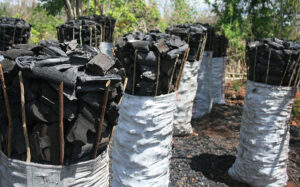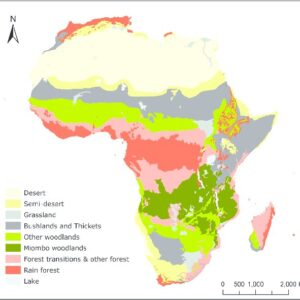How Tanzania’s ‘War on Charcoal’ harms people and the environment
A World Bank study from a few years ago concluded that Dar es Salaam, the capital of Tanzania, consumed the equivalent of 16 olympic-sized swimming pools of wood charcoal every day. Added end to end, our back of the envelope calculation concluded this was enough charcoal to connect Paris and London. What’s more, the study found that the country’s charcoal market (circa 2012) exceeded the value of the country’s tea production. [See Enabling reforms: Analyzing the political economy of the charcoal sector in Tanzania]
Publicly Discouraged, Privately Encouraged
In 2010, when The Charcoal Project was launched, we were astonished to learn the magnitude of the charcoal market in sub-Saharan Africa and how conflicting national policies contributed to a cognitive dissonance between a country’s dependence on charcoal and the well-intentioned but harmful effects of policies designed to protect the environment.
A study published earlier this year titled, “The ‘war on charcoal’ and its paradoxes for Tanzania’s conservation and development,” by Mathew Bukhi Mabele, underscores the conflict between Tanzania’s national policy and the country’s historic social, environmental, and financial reality.
At its core, the paper argues that the Tanzanian government policy of severely restricting charcoal production and consumption on a national level drives illegal economic activity and curtails a vital source of revenue for community, regional, and the national government.
We’ve summarized a few of the more notable takeaways below:
-

TFCG CoForEST Project in Tanzania Antiquated policies rooted in colonial views of forest management. Early 20th century Europe-centric views on forest management were incorporated into national forest management policies that do not take into account the traditional production and consumption of charcoal. Current forest policies do not consider the possibility that charcoal can be sustainably produced in a way that also protects nature and improve livelihoods.
- District and national budgets depend on revenue collection from production and sales, yet actively suppress the role charcoal plays in the economy. This is one of the most vexing policies shared by multiple countries in the region. Essentially, the country ignores the magnitude of the charcoal market while also depending on its revenue. Indeed, charcoal contributes more to the national tax revenue than other types of timber products, according to studies cited in Bukhi Mabele’s paper.
- Countries can legislate charcoal out of existence but they’re only creating more problems. The reality is that charcoal consumption is expected to increase over the coming decades. And until societies are wealthy enough to switch to more “modern” fuels, countries will continue to depend on charcoal for a substantial amount of their nation’s energy needs. Imposing severe restrictions on production and sales of charcoal only hurts producers and consumers, lines the pockets of black- and grey-market traders, and reduces legitimate income for local, regional, and national authorities.
- Charcoal can be sustainably produced in ways that benefit nature and people. Two NGOs in

CoForEST project includes managing sustainable charcoal and timber. Tanzania (TaTedo and TFCG) have proven that community-based forest management can yield healthy forests, better quality charcoal, improve revenue for the producers, and funding for local social development projects. This particular point is especially important as the planet struggles to protect its forestry assets based on the role they play in trapping CO2. In fact, studies show that forests that are owned and managed by traditional territorial communities are healthier, capture more CO2, and have higher indices of biodiversity than even national protected areas. The view that forests are best protected by closing them off to all types of human activity is antiquated, rooted in colonial perspectives, and detrimental to forests and humans alike.
Key Take-a-ways
Conflicting policies means the Tanzania national government depends on revenue from charcoal sales to fill national coffers. Yet the government imposes severe restrictions on production, trade, and use of the fuel. Fortunately, solutions exist.
- Tanzania’s government has a love-hate relationship with charcoal. Unfortunately, this schizophrenia extends to other parts of the continent.
- This study points to two projects that prove that forests managed responsibly can yield benefits for nature, producers, communities, and, even the government.
- A sustainable charcoal operation in the country’s miombo woodlands has proven that community-based forest

Map showing Miombo woodlands in Africa. management can generate high quality charcoal with minimal impact to the environment while also generating income for local community projects, like schools and health centers
- Tanzania’s (and perhaps much of Africa’s) attitude towards tropical forest management is rooted in antiquated, colonial principles that ignore the ancestral relationship between local communities and healthy forest management
- Numerous recent studies show that forests that are owned and managed by local communities are healthier, have more wildlife, and capture more carbon than even national protected area
Overall, it’s time to revisit policies that take into account realities of energy poverty and acknowledge the role that well-managed community-based forestry can play in contributing to the country’s energy balance while also protecting the planet from global warming.
After all, there is a limit to how many olympic-sized swimming pools of charcoal the forests – and the planet – can sustain under current policy environments.
Related: TCP’s blog post “Does Charcoal Have a Future in Africa?”


Thank you for this write up Kim,